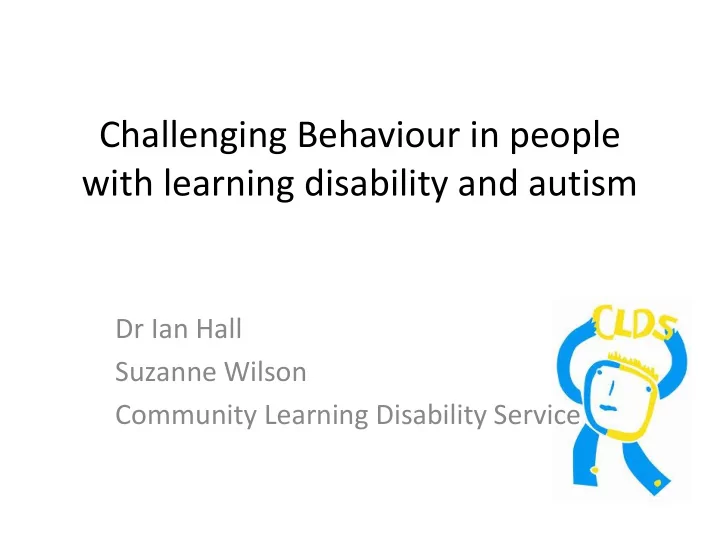

Challenging Behaviour in people with learning disability and autism Dr Ian Hall Suzanne Wilson Community Learning Disability Service
Winterbourne • People with learning disability and autism are higher up political agenda • Use of specialist inpatient services is not generally recommended • People with learning disability and challenging behaviour need to be supported locally in community settings – Including people with very challenging needs – Innovative community approaches are advocated
What is the cause of challenging behaviour?
Challenging behaviour • Culturally abnormal behaviour • Frequency- 3 occasions in the last 6 months • Intensity- significant negative impact on the persons quality of life or life of others – Puts physical safety of self/others at risk, or – Limits use of ordinary community facilities • Often persistent, present across a range of personal and social situations • Not a diagnosis • Bio-psycho-social aetiological model
Common challenging behaviours • Verbally aggressive behaviours • Physically aggressive behaviours • Destructive Behaviours • Self Injurious Behaviours • Sexually inappropriate behaviours • Oppositional Behaviour • Demanding Behaviour • Wandering Behaviour
Causes • Physical: discomfort, pain, malaise, physiological disturbance (e.g. thyroid disorders) • Mental illness: mood disorders, psychosis, anxiety, obsessive – compulsive disorders • Neuropsychiatric disorders: epilepsy, Gilles de la Tourette syndrome, attention-deficit hyperactivity disorder (ADHD), dementia • Pervasive developmental disorders: autism • Phenotype-related behaviours: Prader-Willi syndrome, Lesch-Nyhan syndrome • Psychological trauma: reaction to abuse or loss • Communication difficulties: hearing loss, unclear communication, insufficient vocabulary or means of expression, difficulties
Can you give him medication for his behaviour?
Management • Multidisciplinary – Community Learning Disability Team • Rule out physical health problems • Treat any underlying mental illness • Environmental change • Meaningful activity • Communication intervention • Behavioural interventions – Functional Behavioural Analysis – Management guidelines • Family education/therapy • Support for carers • Psychodynamic therapies – Art therapy, drama therapy
Medication for behaviour problems • Need to identify cause of behaviour problems • Treat mental health problems • Only as part of a holistic care plan • Usually low doses • support to deliver medication • Need physical health monitoring – Blood tests, Blood pressure, weight
New developments • Better housing • Enhancements at CLDS • Day services • Respite • Positive Behaviour Support
Challenging Behaviour in people with learning disability and autism Dr Ian Hall Suzanne Wilson Community Learning Disability Service
Recommend
More recommend